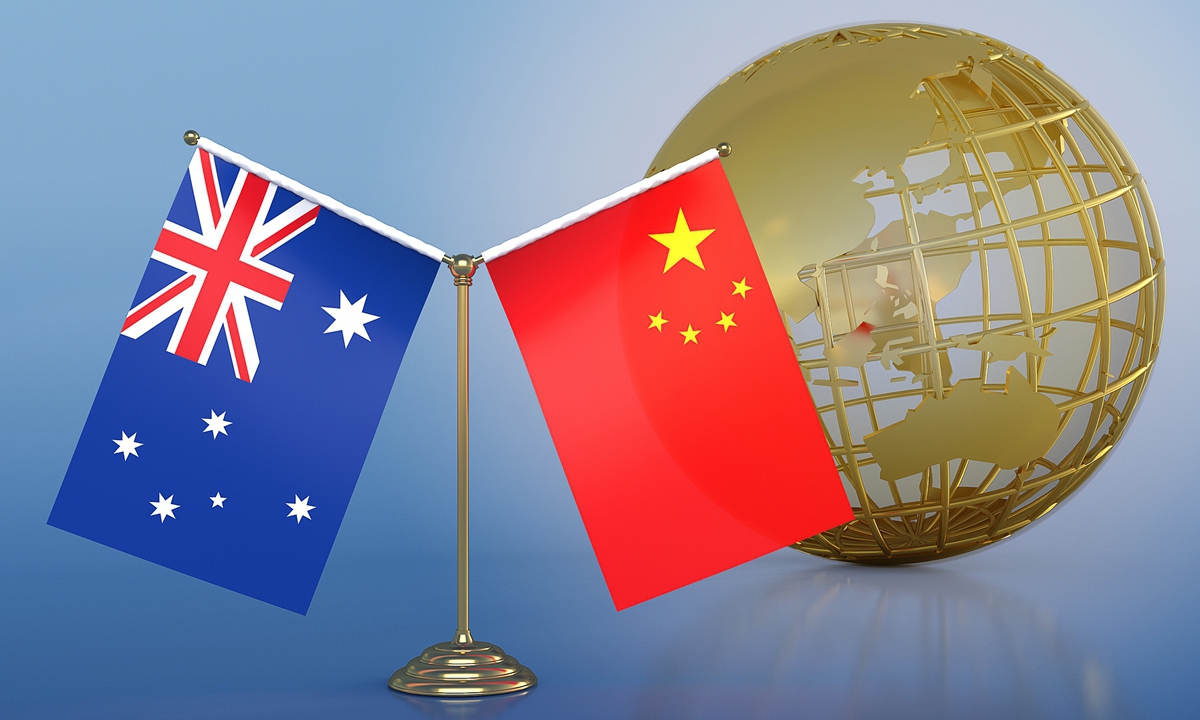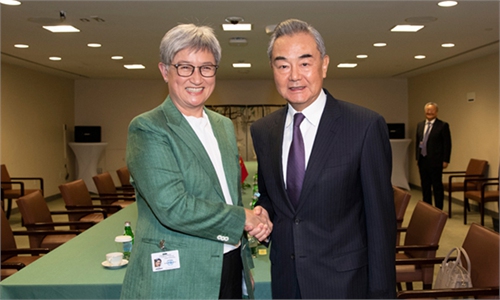
China Australia Photo: CFP
In the face of rising trade protectionism and the US push for "decoupling," the question of how China and Australia can uphold and bolster bilateral economic and trade cooperation and avoid being carried away by third parties amid a complex and changeable international landscape has emerged as a pressing focus of attention.
VOA Chinese claimed on Monday that some Australian experts believe that US protectionism will have a considerable impact on Canberra's policies toward China, which could even lead to renewed tensions between the two countries.
In this context, Chinese Ambassador to Australia Xiao Qian's latest statement may provide certain valuable insights for the future development of economic and trade relations between the two countries.
In a video posted on the website of the Chinese Embassy in Australia on Monday, Xiao said that as two big trading nations, it is important for China and Australia to maintain the globalization process to safeguard the integrity of the global trading system and to help enhance free trade. In another video posted the same day, Xiao noted that "There is no reason for us to compromise our respective national interest for the sake of a third party."
There is no denying that China-Australia economic and trade relations are currently facing multiple external challenges. The rise of trade protectionism has led to an increase in trade barriers in the global market, putting significant pressure on economic cooperation between the two countries.
In the meantime, the US is accelerating its economic "decoupling" push from China, employing various policy tools to undermine China's position in global supply chains. More worryingly, the US is also trying to force its allies to take sides and choose to distance themselves from China economically, adding further complexity and uncertainty to China-Australia economic and trade relations.
In light of such trade headwinds, whether China and Australia can work together to resist this adverse trend is not only crucial for their own economic interests but also vital for the stability and development of the entire Asia-Pacific region and the global economy.
The economic and trade relationship between China and Australia has a solid mutually beneficial foundation, primarily due to the high degree of complementarity between the two economies. Data from China's General Administration of Customs shows that in 2023, the trade volume between China and Australia reached 1.61 trillion yuan ($221.6 billion), setting a historical high with a year-on-year increase of 9.8 percent. Australia's service exports to China grew by 27 percent year-on-year, and actual investment in China increased by 17.1 percent.
For 15 consecutive years since 2009, China has been Australia's largest trading partner, export market and source of imports. China is the main importer of Australian agricultural and mineral products, with over a quarter of Australia's export revenue coming from China. More than 60 percent of China's iron ore imports come from Australia. These figures not only underscore the complementary nature of the two economies but also highlight the irreplaceable significance of bilateral economic cooperation and its substantial growth potential.
However, the economic complementarity and deep integration of industrial chains between China and Australia are increasingly threatened by external third-party forces. The US policies, along with its efforts to pressure allies including Australia into taking sides on economic and political issues, have cast a significant shadow over the China-Australia economic and trade relationship, introducing unprecedented challenges.
This external interference not only undermines the mutual trust that has been built over the years but also poses a hidden threat to the security and stability of global industrial and supply chains. It has the potential to disrupt economic cooperation between the two countries and could trigger far-reaching consequences throughout the entire global industrial chain. If the China-Australia economic and trade relationship suffers severe damage due to these external influences, both nations will face substantial economic losses.
In this context, the approach to enhance cooperation between China and Australia is particularly important. Bilateral and multilateral dialogue mechanisms will play a crucial role in this process. Through these platforms, the two countries can engage in in-depth discussions on key issues such as economic and trade cooperation, investment protection, and technological exchange, working together to seek consensus and solutions. Notably, both sides can leverage the rules and mechanisms of the Regional Comprehensive Economic Partnership (RCEP) to enhance collaboration in areas such as trade, investment and services, thereby jointly promoting regional economic prosperity and development.
Of course, it is possible that differences may arise in certain areas when it comes to enhancing cooperation, but these can be addressed through dialogue and consultation. As long as both parties maintain an open mindset and a pragmatic approach, it is believed that they will ultimately discover effective ways to cooperate.
Global Times



